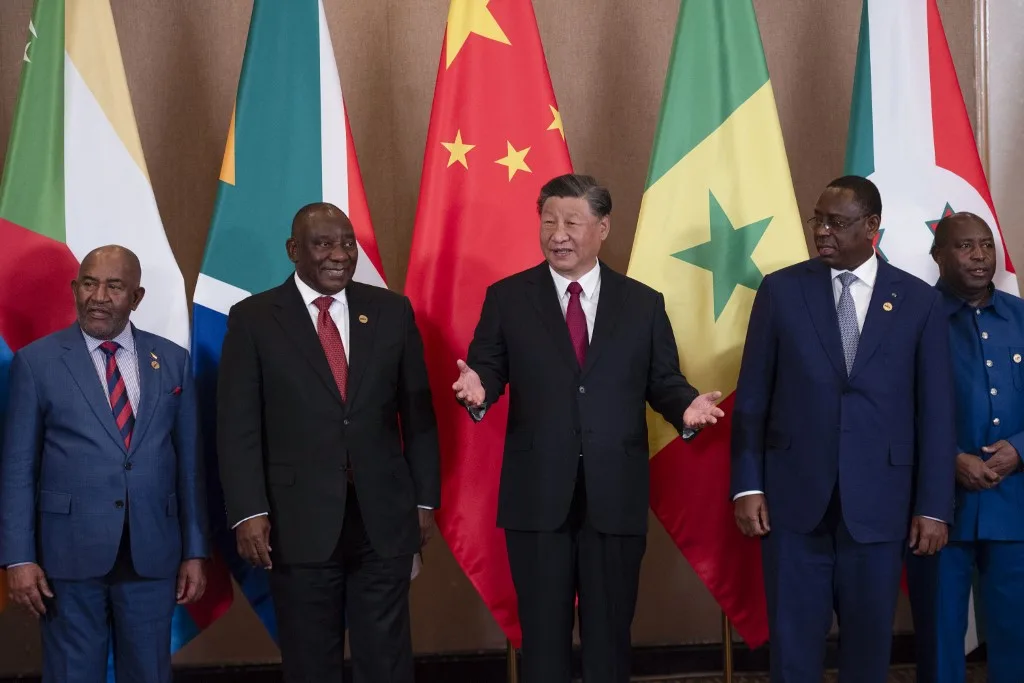World Geostrategic Insights interviews Lewis M. Ndichu on the main strengths and weaknesses of China’s engagement in African countries, the significance of China-Africa partnership, the accusation of using “debt trap diplomacy” leveled at China, and the possible impact on Africa of a drop in Chinese demand.

Lewis M. Ndichu is director of research at the Centre for China Africa Policy (CCAP), Nairobi-Kenya. He is Associate of Art and Science (AAS) International Affairs at Kennesaw State University, Senior Research Associate at the Africa Policy Institute, a member of the Academic Committee of the China-Africa Cooperation Network and the China-Africa Think Tank. Lewis also serves on the advisory boards of leading journals on African affairs.
Q1 – No other country approaches the current depth and breadth of Chinese engagement in Africa. China is Africa’s largest trading partner, a bilateral creditor and a crucial source of infrastructure investment. In addition, Chinese President Xi Jinping, at the China-Africa Roundtable held in Johannesburg on Aug. 24, 2023, announced three new plans for Africa covering agriculture, industrialization, and talent development. More specifically, the plans aim to address challenges in China-Africa economic relations, such as lagging agricultural productivity, lack of production and economic diversification, and insufficient job creation and educational opportunities. They also aim to address obstacles to Africa’s development. In your opinion, what are the main strengths, and possible weaknesses, of Chinese engagement in Africa? How important is China to Africa?
A1 – The Chinese engagement in Africa is at an important juncture in promoting Africa’s growth and investments. In 2023, over $ 2.5 billion worth of direct investments in Africa, a year-on-year increase of 4.4 percent. Bilateral trade between China and Africa saw 11 percent and reached $282 billion in the same year. Further, Chinese companies/entities carried out infrastructure projects and investments worth over $400 billion in the continent. This investment was highly evident in the construction, mining and manufacturing, to emerging industries, such as logistics, digital economy, clean energy, health, green development and finance.
More importantly, China has been Africa’s largest trade partner for 14 consecutive years. However, notwithstanding the concept of win-win cooperation that have franked development projects with Chinese participation, the latter are embedded in a complex dynamic and often controversial infrastructure politics and governance processes.
Africa’s Infrastructure projects with Chinese participation are shaped by various actors in highly dynamic spheres of the state. The extent and forms of state agency excreted are inherently interrelated with and thus highly contingent upon concrete institutional economic and bureaucratic contexts in which African state actors are firmly embedded. For example, the rigorous an unflattering analysis of the contradictions that have arisen in the context of Kenya railway between Mombasa and Nairobi and beyond which has portrayed as a centerpiece of the BRI in East Africa, the project planning, design and implementation of Kenya SGR were seriously compromised by flawed procurement process and the collusion of particular interests.
Q2 – There is no doubt about China’s importance to Africa. As for the other direction, namely China’s interest in Africa, many analysts distinguish between economic and political aspects. According to them, economically, Africa is important, but it is by no means a priority for China. Africa is of interest to China mainly because it borders the sea routes to Europe. The Horn of Africa is certainly important, but China’s main goal is access to the European market. China’s interest in Africa is therefore primarily political. By multiplying major infrastructure projects in Africa, China aims to establish its influence in countries on the continent and gain their support in the international arena, for example in terms of voting rights in the United Nations General Assembly, where China has been able to secure prestigious positions, such as the leadership of UN agencies, thanks to African support. What is your opinion?
A2 – Well, with a population exceeding 1.3 billion and projected to double by 2050, Africa offers a vast consumer base hungry for products and services across various industries. The rising middle class, characterized by increased disposable income and changing consumption patterns, provides opportunities to fill in the ever evolving consumer demands. In this regard, Africa is the future and not Europe nor the United States.
I think Africa is the proverbial beautiful girl that different nations are beginning to learn of its potential. The scramble is in Africa where Europe, China and the United States want to set up shop because of its vast natural resources, environmental friendly regulations, a vast population with availability of labor and the potential of the African Continental Free Trade Area.
Q3 – Much of the infrastructure (roads, railways and ports) that is transforming the African continent is financed by China. Chinese loans are playing a key role in financing infrastructure projects and stimulating economic growth in many African countries. However, Chinese loans have often been associated with “debt trap diplomacy.” This expression, coined by an Indian think tank and then widely taken up by Western experts and governments, argues that China could use its loans to trap African countries in unsustainable debt, which could lead to a loss of sovereignty. As an example, during her visit to Senegal in January 2023, U.S. Treasury Secretary Janet Yellen urged African countries to “be wary of attractive deals.” These can “be opaque and in the end fail to help the people they intend to help,” she said, referring to agreements made in Africa by China. What is your opinion? Is this accusation justified?
A3 – No this is not justifiable. The China- Africa partnership has generated intense campaigns of disinformation and blatant misrepresentation of both China and Africa. These campaigns depict both China and Africa as corrupt. Moreover, a sinister China is trapping ignorant Africans in debt. Regrettably, the China-Africa partnership has become a battlefield for the competition between an ascendant China and Africa’s other partners from the West.
Although, Africa must design to rise with China debt advanced by China must be sustainable and competitive. But, as the ongoing competition between the US and China poses serious threats to Africa’s independence, security and progress. To minimize damage from China-US rivalry, Africans must develop and advance common positions in their dealings with both China and the US.
Q4 – The International Monetary Fund has warned African countries of the possibility of a regional economic recession and the ripple effects that China’s economic slowdown could bring. According to the IMF, the Sino-Africa partnership is threatened by China’s economic slowdown and aging population, trade tensions, geopolitical and lingering impacts of the COVID-19 pandemic. The IMF urges African governments to diversify their economies, increase regional trade integration, and create a business environment conducive to the growth of local and international companies. What is your opinion? Are there problems in exporting African products to China because of the decline in Chinese demand? Do African countries need to find new trading partners to develop their economies?
A4 – In my opinion the Chinese economic slowdown has had ripple effects of China’s ability to extend sovereign lending to Africa rather than impacts on commodity exports and bilateral trade of goods and services. This is because as of April 2023, the sum of exports and imports between Africa and China was measured at roughly 25.5 million U.S. dollars which is still a good figure.
Over the past 20 years, tens of thousands of kilometers of new railway lines have been built across Africa – much of it constructed and financed by China. But the days when Beijing paid big bucks to build these kinds of large-scale infrastructure projects in Africa have come to an end. Today, China’s development priorities on the continent are focused more on fostering industrialization and building smaller, greener projects mostly in the energy and telecommunications sectors.
But even without the Chinese, a number of African governments are moving forward with ambitious plans to build vast regional rail networks. On the other hand, as an immediate next step, the United States and the European Union are putting mechanisms to support African governments in launching/re-launching pre-feasibility studies for the construction of critical infrastructure projects for some selected countries.
Lewis M. Ndichu – Director of research at the Centre for China Africa Policy (CCAP), Nairobi-Kenya.







